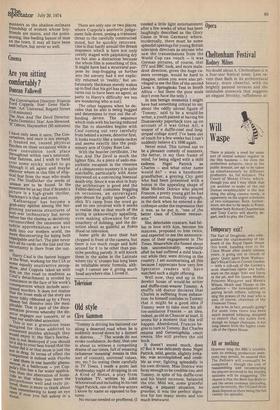Television
Old style
Clive Gammon
"Tommy is driving his battered car along a deserted road when he is suddenly waved down by a damsel in distress. . ." The words do not evoke confidence, do they, that one is about to witness a compelling drama of our times, full of meaning (whatever 'meaning' means in this sort of context), universal values, etc, etc.? So noting them carefully in TV Times, I made a point last Wednesday night of dropping in on A Kind of Bonus, a play from Yorkshire TV, written by John Whitewood and including in its cast Nigel Patrick, one of the few actors I know by name as opposed to features.
No excuse needed or proffered. (I needed a little light entertainment after a few weeks of what has been laughingly described as the Glory Game in West Germany where, incidentally, there must be some splendid openings for young British television directors as anyone who saw the transmissions from the World Cup can vouch — it was German pictures, of course, that ITV and BBC took, and more maladroit direction, given the huge camera coverage, would be hard to imagine, unless you were also privileged to see the film of the second Lions v. Springboks Test in South Africa — but there the poor souls don't even have the telly.) In less benign moments I might have had something critical to say about the oddly unreal figure of 'Tommy,' said to be a would-be writer, a youth pained at having his Dostoievsky paperback torn up on account of it was Great Art, a wearer of a duffle-coat and long, striped college scarf. I've been out of touch for a few weeks but I can't suddenly believe it's 1956 again.
Never mind. This turned out to be a pleasant comedy of manners, the better, in my then frame of mind, for being edged with a mild sadness. Nigel Patrick as Charles — and what other name would do? — was a handsome grandfather, a greying City gent who had been presented with a bonus in the appealing shape of Miss Michele Dotrice who played Frances, a pretty young girl he had stumbled across, literally enough, in the dark when he entered a discotheque under the impression that it was, as he put it, "one of the better class of Chinese restaurants."
She, delectable creature, had fallen in love with him, become his mistress, proposed to him twice, and expected to see the announcement of their engagement in The Times. Meanwhile she fussed about him unconscionably, especially afteihe had suffered a mild blackout while they were driving in the country. I am summarising all this because I appreciate how very few Spectator readers will have watched such a slight offering.
Well now, they end up in the derelict house of would-be writer and duffle-coat-wearer Tommy. A snuffly old doctor declares that Charles is suffering from exhaustion: he himself confides to Tommy that it might be a good idea if Tommy were to take over his alltoo-assiduous Frances — an idea, indeed, as old as Chaucer at least. It seems for a moment that this will happen. Abandoned, Frances begins to turn to Tommy. But Charles returns and Gerontophilia vincit omnia. She still prefers the old buck.
It doesn't sound much, does it? But it was delicately done. Nigel Patrick, mild, gentle, slightly irritable, was accomplished and credible as ever, fighting splendidly in his own division. Miss Dotrice was fussy enough to be credible too, and Tommy, in spite of his duffle-coat and his bland niceness, balanced the trio. Mild wit, some graceful acting, a piquant situation, no gravitas, it was the perfect digestive for too many steins and too much bratwurst.


































 Previous page
Previous page